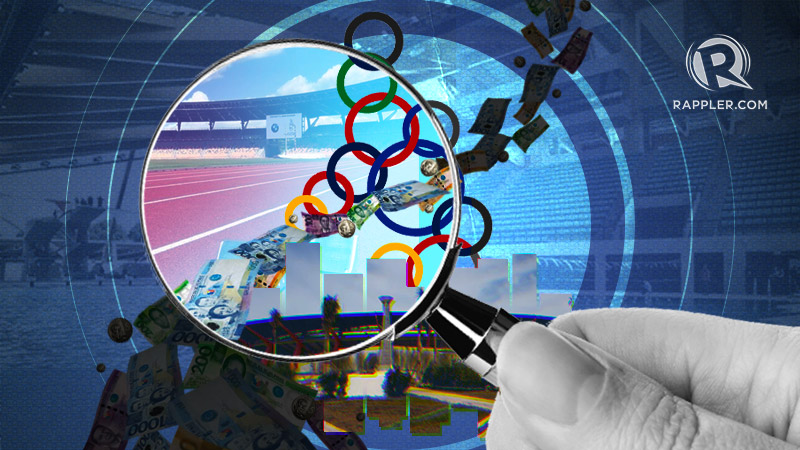SUMMARY
This is AI generated summarization, which may have errors. For context, always refer to the full article.
![[ANALYSIS] Following the money trail of the 30th SEA Games](https://www.rappler.com/tachyon/r3-assets/612F469A6EA84F6BAE882D2B94A4B421/img/C712AD661E2D41C39519471FB9DCD7B9/following-the-money-trail-of-the-30th-sea-games-november-28-2019.jpg)


There’s no point sugarcoating it. It’s been a shitshow.
From delegates who waited for nearly 3 hours at the airport only to be brought to the wrong hotel, non-halal food served to Muslim delegates, and unfinished venues rushed by construction workers toiling round the clock, the 30th SEA Games so far has been mired in a ton of logistical nightmares.
It came to the point that Thailand’s men’s football team had to practice in the streets, Vietnam’s women’s football team bought their own food from a supermarket near their hotel, and our very own Philippine football team brought in a private bus company to fill transport gaps.
Blame got passed around quickly, and all eyes are on House Speaker Alan Peter Cayetano, who also chairs the Philippine SEA Games Organizing Committee, Inc. (PHISGOC) – a “non-stock, non-profit organization” established purposely “to oversee the preparations and execution of the Philippines’ hosting” of this year’s SEA Games.
In this piece, let’s try to make sense of the myriad mishaps and anomalies by following the money trail.
Budget delay
Amid mounting criticisms – and reports that President Rodrigo Duterte himself is displeased with the logistical lapses so far – PHISGOC COO Ramon Suzara recently lamented that the budget for the SEA Games was approved only in April, giving their team just about 8 months to prepare.
Earlier, Representative Mikee Romero – who also leads the country’s polo team – similarly put the blame on the 2019 budget delay which, he said, was partly due to the Senate.
He specifically mentioned Senator Frank Drilon who recently castigated those responsible for the exorbitant P50-million SEA Games cauldron.
Although the 2019 budged did get delayed, it was due largely to setbacks in the House, not the Senate. (READ: How pro-Duterte lawmakers hurt economic growth)
The budget deadlock ended, in fact, thanks to the efforts of the Senate, which transmitted the budget bill to the Palace despite “strong reservations.” Were it not for such compromise, we would have reenacted in toto the 2018 budget, which had no allocation for the SEA Games.
The New Clark City Sports Hub in Capas, Tarlac – which will host a handful of events – was also built early last year through a joint venture between the Bases Conversion and Development Authority (BCDA) and Malaysian firm MTD Capital Berhad using P8.5-billion loaned from the Development Bank of the Philippines.
Hence, these sports facilities could not have been bogged down by the 2019 budget delay.
Money trail
Upon closer inspection, the money trail for the SEA Games reeks of anomalies. Everything got muddled by the unwelcome entry of PHISGOC into the scene.
Originally, public money for the SEA Games – amounting to P7.5 billion – was mysteriously lodged in the Department of Foreign Affairs (DFA) at the behest of its former secretary, Cayetano.
This is baffling. The DFA is obviously not the best agency to manage and oversee the SEA Games.
Upon Cayetano’s resignation in October last year, his successor Teodoro Locsin Jr quickly spotted this irregularity and asked that the Senate lodge such funds elsewhere.
Such funds did get transferred to the Philippine Sports Commission (PSC). But this January, through Memorandum Circular 56, Duterte officially recognized the Cayetano-led PHISGOC as the main showrunner and ordered all government agencies to give it “full support and assistance.”
Now, the SEA Games got allotted a total budget of P6 billion (P5 billion from the 2019 budget plus an extra billion from the contingent fund).
But in a recent Senate hearing Cayetano claimed the PSC and the Philippine Olympic Committee (POC) were overwhelmed and could not bid out contracts by themselves.
So these agencies ended up sharing responsibilities with PHISGOC and infusing it with P1.5 billion in “financial assistance” – a transfer that exempted such funds from usual bidding rules because, again, PHISGOC is a private entity.
Note that lodging public funds in private foundations was exactly the main mode of corruption used in the pork barrel scam years back.
Why PHISGOC at all? The PSC and POC said they can, in fact, work together and do the work of PHISGOC.
Duterte, too, had misgivings about PHISGOC. He said in July, “That PHISGOC foundation only muddles up the issue. So many fingers are dipping into the hosting. It should only be government. I want just one, just the government.”
The P6-billion SEA Games budget, by the way, is separate from the multibillion funding for the New Clark City Sports Hub, which has its own share of anomalies.
As reported by Rappler in a special series, the joint venture that paved the way for it pushed through even without a public bidding and even without a favorable legal opinion from the Office of the Government Corporate Counsel.
Inefficiencies galore
Finally, it’s increasingly evident the SEA Games funds are being grossly mishandled.
Figure 1 shows the detailed breakdown of the SEA Games budget, coming from PSC, according to a reliable source. About half was handled by the Department of Budget and Management, a quarter by PHISGOC, and the rest was split between the PSC, POC, and DPWH.
Figure 1.
Figure 2 shows a further parsing of PHISGOC’s P1.5-billion budget. The infamous P50-million cauldron (“Kaldero ng Diyos” quipped netizens) made up 3.7% of PHISGOC’s budget.
Figure 2.
You’d think billions worth of funds would insure against logistical catastrophes. But you’d be wrong.
Despite a P380-million budget on accommodations, foreign delegates ended up resting on the floor and waiting in function rooms because their rooms weren’t ready yet when they arrived.
Despite a P360-million budget on marketing and advertising, we ended up with an official logo and an official mascot (Pami) that have since become the butt of jokes online.
Despite a P79-million budget on VIP and halal catering services, Indonesia’s men’s football team ended up getting served non-halal food. Brunei’s football team’s captain – a nephew of the Sultan of Brunei – was also rushed to the hospital due to an allergic reaction triggered by peanuts mixed in his curry.
And despite a P50-million budget on the SEA Games cauldron, it turned out to be just a hollow, small-scale version of the late National Artist Bobby Mañosa’s 1996 design for a proposed Centennial Tower.
Is government simply less efficient than the private sector in organizing international sporting events? Not at all.
Remember that PHISGOC is a private entity, just one with zero experience in organizing sports events (or any event for that matter). Between them, our government agencies also have decades (if not a century) of experience when it comes to hosting big events.
Again, why did PHISGOC have to hog the limelight?
Get your act together
So many mishaps and anomalies have marred the start of the 30th SEA Games, and the opening ceremony hasn’t even happened yet.
Overwhelmed by the negative feedback, a number of politicians have called for a political “ceasefire,” hoping our people will focus instead on supporting our athletes.
But that’s fallacious. We can criticize the organizers’ many faults even while we are supporting our athletes. They’re not mutually exclusive.
In fact, it is crucial we keep track of all the problems now so we can better exact accountability from the organizers later.
It’s one thing to hear the barrage of criticisms from our fellow Filipinos, but yet another to hear them coming from our ASEAN guests.
The official slogan of the 30th SEA Games is: “We win as one.”
Here’s hoping the corollary – “We fail as one” – will spur the organizers to get their act together in the coming days. – Rappler.com
The author is a PhD candidate at the UP School of Economics. His views are independent of the views of his affiliations. Follow JC on Twitter (@jcpunongbayan) and Usapang Econ (usapangecon.com).
Add a comment
How does this make you feel?
There are no comments yet. Add your comment to start the conversation.